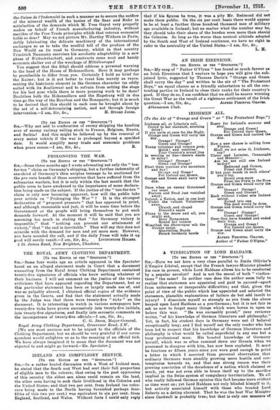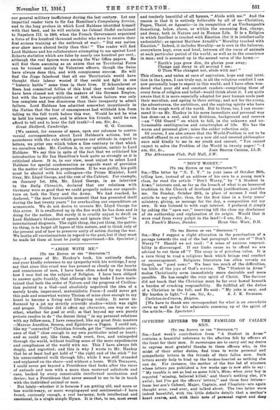A VINDICATION OF LORD HALDANE.
[To THE EDITOR OP THE "SPECTATOR."] Sm.—Have we not here a very close parallel to Emile 011ivier's L'Empire Libgral, except that the French lawyer-Minister pleaded his case in person, while Lord Haldane allows his to be conducted by a popular novelist? And is not the moral of both " vindica- tions " the same? In neither case does the author seem fully to realize that statesmen are appointed and paid to succeed—apart from unforeseen or insuperable difficulties; and that, given the point of view of the public which has appointed and salaried the statesmen, plausible explanations of failure do but add insult to injury? I dissociate myself as strongly as you from the abuse heaped upon Lord Haldane as a pro-German; but it is not fair to ask us now to forget many things which were borne in upon us before this war. "He was excusably proud," your reviewer writes, "of his knowledge of German literature and philosophy." Yet, in fact, his student days in Germany were not (I believe) exceptionally long; and I find myself not the only reader who has been led to suspect that his knowledge of German literature and philosophy is what would be called superficial in any one but a busy professional man. His boasted knowledge of Germany herself, which was so often rammed down our throats when we presumed to disagree with him, has now been exploded. It must be fourteen or fifteen years since you were good enough to print a letter in which I asserted from personal observation that ordinary Germans were steadily growing more hostile and cons temptuous towards us, and that one strong reason was their growing conviction of the decadence of a nation which claimed so much, yet was not even able to brace itself up to the sacrifice implied in the Swiss system of compulsory territorialism. To all who really followed German opinion this fact became more evident as time went on; yet Lord Haldane not only blinded himself to it, but actively associated himself with those who treated Lord Roberts as a doting alarmist. That he was the best War Minieter since Cardwell is probably true; but that is only one measure of
our general military inefficiency during the last century. Let any impartial reader turn to Sir Ian Hamilton's Compulsory Service, and to the long preface in which Lord Haldane identified himself with that book, and he will exclaim (as Colonel Stoffel exclaimed to Napoleon III. in 1868, when the French Government organized a force of five hundred thousand mobiles who were to receive their first serious training at the outbreak of war): "Did any nation ever show more absurd levity than this!" The reader will find Lord Haldane and his collaborators attempting to use against Lord .Roberts statistics which are false by nearly one hundred per cent., although the real figures were among the War Office papers. He will find them assuming as an axiom that no Territorial Force can be trained mainly by Volunteer officers, though the Swiss have always done this, and with conspicuous success. He will find the Jingo falsehood that all our Territorials would have thought their labour wasted if they could not fight in one " historic battle" some time in their lives. If Scharnhorst or Boon had committed follies of this kind they would long since have been classed not with the makers of the German Empire, but with the lawyer-politicians of 1848, whose failure was only less complete and less disastrous than their incapacity to admit failure. Lord Haldane has admitted somewhat incautiously in the Nation that the fear of consequences had withheld him from . telling us the full truth before this war. Would he not be wise to hold his tongue now, and to silence his friends, until he can afford to tell and to hear the full truth?—I am, Sir, do., [We cannot, for reasons of space, open our columns to contro- versial correspondence about Lord Haldane's actions, but in accordance with the rule which governs our attitude in regard to letters, we print one which takes a line contrary to that which we ourselves take. Mr. Coulton is, in our opinion, unfair to Lord Haldane. We say this in spite of the fact that we criticized his introduction to Sir Ian Hamilton's book quite as strongly as it is criticized above. It is, in our view, most unjust to select Lord Haldane for special condemnation as regards want of prevision in the matter of German preparedness. If he was guilty, his guilt must be shared with his colleagues—the Prime Minister, Lord Grey, Mr. Lloyd George, and the rest of the Cabinet. For example, on January 1st, 1914, Mr. Lloyd George, in an interview in the Daily Chronicle, declared that our relations with Germany were so good that we could properly reduce our expendi- ture on both the Navy and the Army. We had reached, he declared, "the most favourable moment that has presented itself during the last twenty years" for overhauling our expenditure on armaments. We do not desire to censure Mr. Lloyd George for this error. It is swallowed up in the fine work he has done and is doing for the nation. But surely it is cruelly unjust to dwell on Lord Haldane's blunders of speech and ignore this " howler " in international diagnosis. The right thing, the just thing, the patrio- tic thing, is to forget all lapses of this nature, and to think only of the present and of how to preserve unity of action during the war. We loathe all recriminations in regard to the past, but if they must be made let them at least be justly apportioned.—ED. Spectator.]



































 Previous page
Previous page